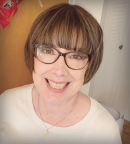Soon after my marriage, in 2003, I noticed swelling in the glands around my throat. Although I otherwise felt fine, I went to see my primary care physician for a checkup and a blood test. The results of the test showed that I had an abnormally high number of lymphocytes circulating in my bloodstream. Concerned, my doctor ordered a tissue biopsy of one of the swollen lymph nodes in my neck, which tested positive for chronic lymphocytic leukemia (CLL). I was just 47 years old and very young to have developed a cancer that is typically diagnosed in older adults.
For the first 2 years after my diagnosis, a combination chemotherapy regimen of fludarabine and cyclophosphamide plus the monoclonal antibody rituximab kept the cancer stable, allowing me to live my life uninterrupted. But in 2006, the cancer had progressed to my brain, affecting the sight in my right eye. My oncologist determined that I needed an allogeneic stem cell transplant to stabilize the disease and give me a shot at a cure. He explained that I would likely experience the potentially serious complication of graft-vs-host disease from my immune system attacking the donor cells, but, fortunately, that didn’t happen. In fact, my donor’s cells were such a close match to my human leukocyte antigen (HLA) markers, the transplant was a complete success. Soon after the transplant, I met my donor, and we have become great friends. It is not an exaggeration to say that she, along with the members of my transplant team, helped save my life.
Getting a Second Chance at Life
Although the allogeneic stem cell transplant rid me of CLL, in 2020, just as the COVID-19 pandemic was starting to flourish around the world, I was diagnosed with another life-threatening blood cancer, diffuse large B-cell lymphoma. Dreading the thought of having to undergo another allogeneic stem cell transplantation, I was thrilled to learn that axicabtagene ciloleucel, a chimeric antigen receptor (CAR) T-cell therapy, had been approved by the U.S. Food and Drug Administration a few years earlier for certain types of large B-cell lymphomas. I already trusted my oncology team with my life, so after my oncologist explained the procedure and how my own T cells could be genetically modified to boost my immune system to attack the cancer, I immediately agreed to the therapy.

What has given me great solace throughout my cancer experience is the unending support and care I’ve received—and continue to receive—from my oncologists and my whole medical team.— Donna Chen
Tweet this quote
I received several rounds of the chemotherapy agent venetoclax and the Bruton’s tyrosine kinase inhibitor ibrutinib in preparation for the CAR T-cell therapy. Both the CAR T-cell therapy and the allogeneic stem cell transplantation were equally difficult, but I had a quicker recovery with the CAR T-cell therapy. Most important, today, I have no evidence of disease. I am cancer-free.
Facing Future Challenges
I am no stranger to serious illness. I was diagnosed with juvenile diabetes when I was 7 years old and have had to learn how to manage a lifelong chronic condition while living a full and purposeful life. But coping with cancer, twice, has made me more anxious. I’m more afraid now of the future, and I’m doing the best I can to stay in the present. I’m very careful to keep myself as healthy as possible, especially during this time of COVID.
What has given me great solace throughout my cancer experience is the unending support and care I’ve received—and continue to receive—from my oncologists and my whole medical team. During my active cancer treatment, whenever I was with my chief oncologist, he was laser-focused on me and my concerns. I was his partner in all medical decision-making, and it was that level of support that has helped me get back a feeling of control over my health and my life.
I am grateful to all the researchers who have made progress in oncology care a reality for so many cancer survivors and who are allowing us to live long, high-quality lives. My oncologists were convinced that I would have a good outcome, and their optimism gave me the confidence to go through treatment and some dark times and come out the other side.
It is that confidence that is propelling me forward now and giving me the self-assurance to face any new challenges that may come my way. I know cancer is a wily disease and there are no guarantees I won’t have to contend with it again. But having that knowledge is not preventing me from living my best possible life.
Ms. Chen lives in Wood-Ridge, New Jersey.
Editor’s Note: Columns in the Patient’s Corner are based solely on information The ASCO Post received from patients and should be considered anecdotal.

